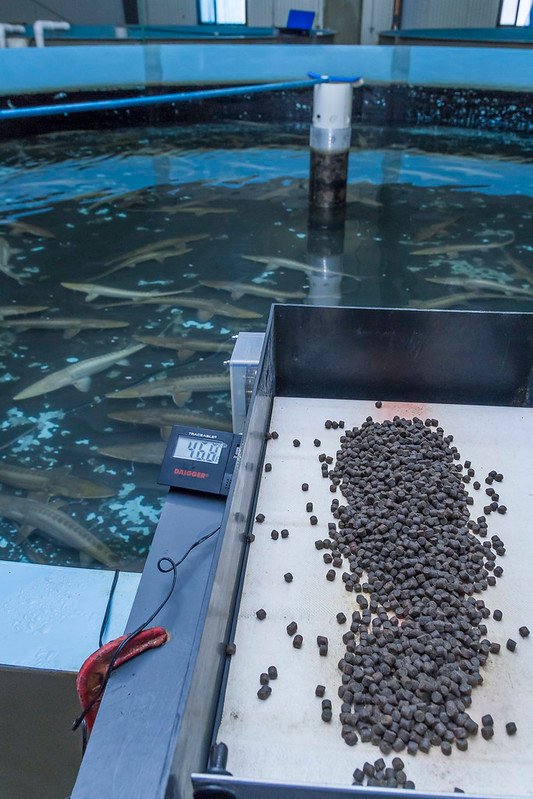
The demand for sustainable farming of animals and fish is pushing boundaries. This scenario is driving the growth of the aquaculture industry, and with it, the demand for aquaculture feed. This presents a challenge due to the need to find sustainable alternative inputs. Octacosanol is emerging as a new and promising ingredient for feeding various aquaculture species.
A scientific review published by researchers from Alexandria University (Egypt), Khwaja Fareed University of Engineering and Information Technology (KFUEIT) in Pakistan, and Tishk International University (Iran) delves into octacosanol, a long-chain alcohol derived from plants with the potential to revolutionize the way we feed livestock and fish.
What is Octacosanol and How Does It Work?
Extracted from plants like sugar cane, rice, wheat, and fruits, octacosanol offers a multifaceted approach to animal and fish nutrition. The main described benefits include:
- Potential Nutritional Benefits: Studies suggest that octacosanol can influence fat metabolism, potentially reducing fat accumulation and increasing the utilization of fatty acids for energy. Early research also hints at its role in lowering cholesterol levels.
- Reproductive Enhancement: In hens, octacosanol might influence the development of reproductive organs and follicles, potentially improving egg quality and laying performance. Its antioxidant properties could also benefit sperm health.
- Antioxidant Power: Similar to vitamin E, octacosanol can act as an antioxidant, protecting cells from damage caused by free radicals. This could be especially beneficial for animals exposed to stress.
- Immune System Support: Research suggests that octacosanol might possess immunostimulant properties, which could help animals fight infections and diseases.
- Safety and Additional Functionality: Derived from natural sources, octacosanol appears to be a safe supplement for animals. Studies also indicate it may promote better sleep and reduce stress.
The Power of Natural Sources
The scientific review published in the Journal of Animal Physiology and Animal Nutrition highlights two key sources of octacosanol:
- Wheat Germ Oil: Rich in octacosanol, vitamin E, and essential fatty acids, wheat germ oil offers a natural approach to animal health. The vitamin E in wheat germ oil acts as an antioxidant and further promotes well-being.
- Rice Bran Oil: Extracted from rice bran, this oil has a unique composition that can offer health benefits. Its high unsaponifiable fraction (including antioxidants and minerals) contributes to its potential value.
Benefits for Aquaculturists
Both livestock farmers and aquaculturists could gain significant benefits:
- Growth Power: Studies suggest that octacosanol can improve growth performance in animals like chickens, crayfish, and even mice. It could enhance feed efficiency, meaning animals gain more weight from the food they consume.
- Reproductive Benefit: Research indicates that octacosanol supplementation can benefit reproduction in poultry. It could potentially increase egg production in hens and improve ovarian function in crayfish.
- Body Composition Magic: Early research suggests that octacosanol could influence body composition, potentially reducing fat and increasing muscle protein content. This could be particularly interesting for the meat industry.
- Antioxidant Advantage: Octacosanol exhibits antioxidant properties, which could help protect cells from damage and potentially contribute to overall health.
- Immune System Support: Initial studies suggest that octacosanol could bolster the immune system of crayfish, potentially increasing their disease resistance.
Sustainability in Focus
The sustainability of octacosanol is a key consideration:
- Ecological Potential: Derived from plants, octacosanol offers a potentially more sustainable alternative to some traditional feed additives.
- Knowledge Gaps Persist: More research is needed to fully understand the long-term environmental impact of octacosanol use.
Addressing Challenges and Charting the Future
Despite its promise, there are areas for further exploration:
- Dose Optimization: Finding the most effective and safe dose for different animals and fish is crucial.
- Interaction with Other Additives: Understanding how octacosanol interacts with existing feed additives is essential.
- Regulatory Considerations: Ensuring regulatory compliance for safe and responsible use is paramount.
Conclusion
“Octacosanol, a natural compound derived from various plant sources, has shown a wide range of beneficial effects on growth performance, immune modulation, stress reduction, and overall health improvement in several animal species,” conclude the authors of the scientific review.
Despite the potential of octacosanol as a sustainable and versatile feed additive, more research is needed to fully unlock its benefits, and a proposed research plan in the study paves the way for future investigations.
Stay Always Informed
Join our communities to instantly receive the most important news, reports, and analysis from the aquaculture industry.
Contact
Akram Ismael Shehata
Department of Animal and Fish Production, Faculty of Agriculture (Saba Basha), Alexandria University
Alexandria 21531, Egypt.
Email: akramismael2@gmail.com and akramismael2@alexu.edu.eg
Majeeda Rasheed
Department of Life Sciences, Khwaja Fareed University of Engineering and Information Technology (KFUEIT)
Rahim Yar Khan, Punjab, Pakistan.
Email: majeeda.rasheed@kfueit.edu.pk
Mohammed F. El Basuini
Faculty of Desert Agriculture, King Salman International University, Egypt.
Email: mohammed.elbasuini@ksiu.edu.eg
Reference (open access)
Shehata, A. I., Rasheed, M., Rafiq, H., Khalid, N., Rafique, A., Alhoshy, M., Habib, Y. J., & El Basuini, M. F. Multi-functional application of octacosanol as a feed additive in animal and aquaculture: A review. Journal of Animal Physiology and Animal Nutrition. https://doi.org/10.1111/jpn.14002
Editor at the digital magazine AquaHoy. He holds a degree in Aquaculture Biology from the National University of Santa (UNS) and a Master’s degree in Science and Innovation Management from the Polytechnic University of Valencia, with postgraduate diplomas in Business Innovation and Innovation Management. He possesses extensive experience in the aquaculture and fisheries sector, having led the Fisheries Innovation Unit of the National Program for Innovation in Fisheries and Aquaculture (PNIPA). He has served as a senior consultant in technology watch, an innovation project formulator and advisor, and a lecturer at UNS. He is a member of the Peruvian College of Biologists and was recognized by the World Aquaculture Society (WAS) in 2016 for his contribution to aquaculture.







